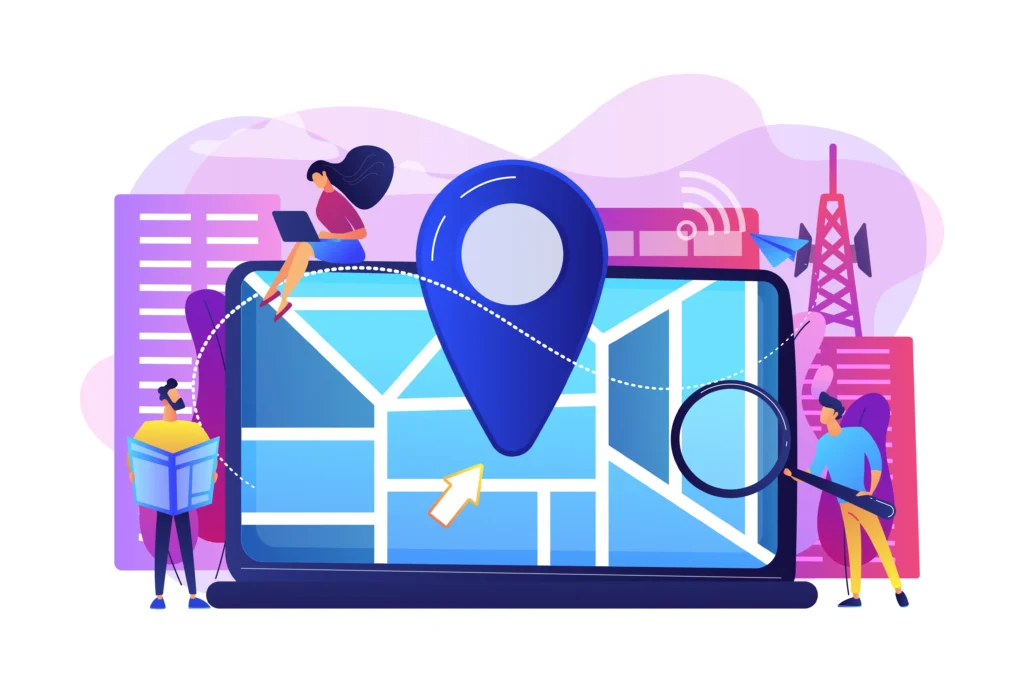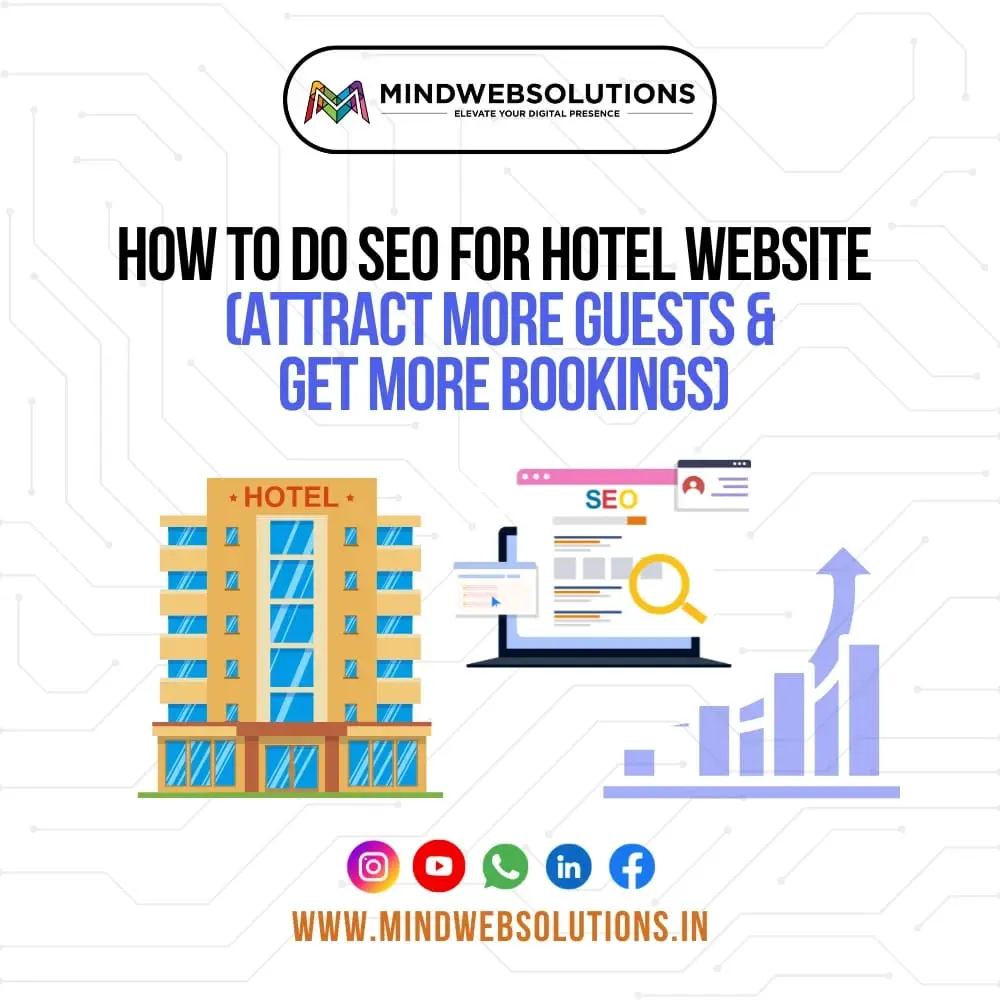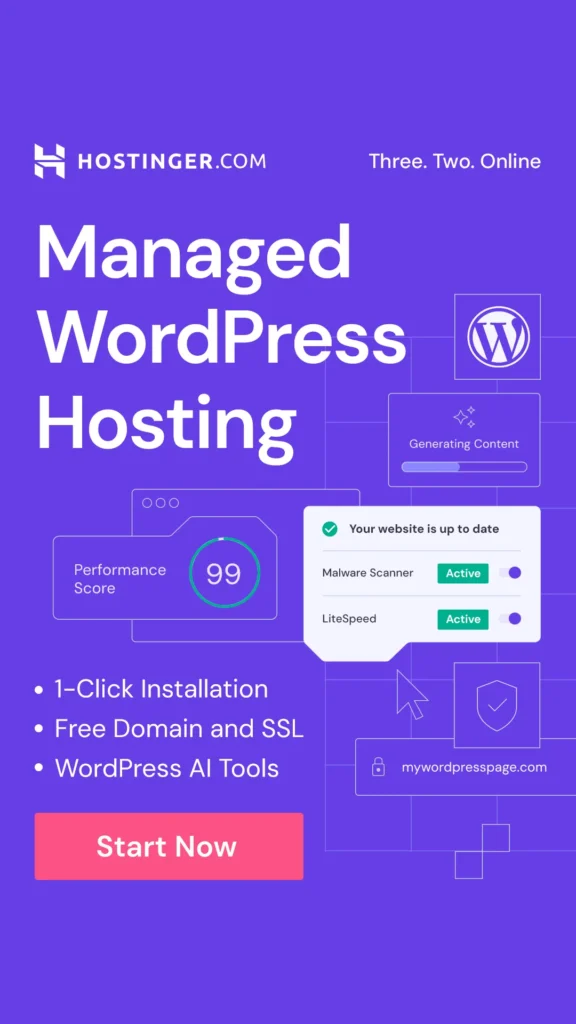How To Do Seo For Hotel Website: Essential Steps
SEO for a hotel website involves optimizing various aspects of your site to improve visibility on search engines, attract more visitors, and ultimately boost bookings. Here’s good Way to Do SEO for Hotel Websites.
Keyword research and optimization: Identify and use relevant keywords that potential guests are searching for, such as “best hotels in [location]” or “affordable accommodations in [city name].” Include these in your hotel website content, meta tags, and headings.
Local SEO strategies: Optimize your website for local search by claiming your Google My Business listing, making sure your NAP (name, address, phone number) is consistent across the web, and including location-specific content on your site.
Mobile-friendly design: Make sure your website is responsive and loads quickly on mobile devices. Many users book hotels on their phones, so mobile-friendly design is important for both user experience and SEO.
Content Marketing: Create valuable content such as blog posts about local attractions, travel tips, and hotel amenities. This not only attracts visitors but also helps improve your search engine rankings by targeting long-tail keywords.
On-Page SEO Techniques: Optimize your website’s on-page seo elements, including title tags, meta descriptions, headlines, and image alt text. Use schema markup to enhance search engine understanding of your content and improve click-through rates.
Building High-Quality Backlinks: Get backlinks from reputable websites in the travel industry, such as travel blogs, tourism websites, and local businesses. These links improve your domain authority and search engine rankings.
Using Social Media: Promote your website’s content on social media platforms to increase visibility, drive traffic, and build engagement with potential guests. Social signals can indirectly boost your SEO efforts.
Monitoring and analysis: Use tools like Google Analytics and Google Search Console to monitor your SEO performance, track visitor behavior, and identify areas of improvement. Regularly adjust your strategy based on data insights.
On-Page Optimization Techniques
On-page SEO for Hotel website is crucial for improving the visibility of your hotel website on search engines. It involves optimizing individual web pages to rank higher and attract relevant traffic. Key aspects include keyword optimization, meta descriptions, and high-quality content creation. By focusing on these elements, you can ensure that your website is more appealing to both search engines and users, leading to better rankings and increased bookings.
Keyword optimization
Strategically place relevant keywords in your content, including titles, headings, and body text. This helps search engines understand what your page is about and match it to a user query. However, avoid keyword stuffing; use keywords naturally to maintain readability.
Meta descriptions
Create catchy meta descriptions for each page. Although these don’t directly impact rankings, they are important for click-through rates. A well-written meta description provides a concise summary of your page and motivates users to click your link when it appears in search results.
Content Creation
Create informative and engaging content that addresses the needs and interests of your target audience. High-quality content not only improves the user experience but also encourages other sites to link to your content, which boosts your hotel’s SEO.
Optimizing Titles, Headings, and URLs
- Titles: Make sure each page has a unique, descriptive title that includes the primary keyword. Titles should be concise and give a clear indication of what the page is about.
- Heading: Use heading tags (H1, H2, H3, etc.) to structure your content. The H1 tag should contain the main keyword and clearly state the topic of the page. Subheadings (H2, H3) help break up the content and make it easier for users and search engines to navigate.
- URLs: Create clean, keyword-rich URLs that describe the page’s content. Avoid using long, complex URLs with unnecessary parameters. Instead, use simple, readable URLs that are easy for users to remember and easy for search engines to index.
Off-Page Optimization For Hotel Websites
Link Building: Link building is an important off-page SEO strategy because search engines see it as trustworthy when most websites link to your hotel website. It gives the search engines the confidence that your website is genuine and trustable.
Social Media Marketing: Social media platforms like Facebook, Instagram and Twitter are beneficial for driving traffic to your hotel. You can share hotel offers and deals on social media which will attract more and more people to your hotel and also increase your off-page SEO.
Online Reviews: Getting online customer reviews on your Google My Business page and platforms like Trip Advice helps your hotel business boost off-page SEO. When a customer sees your reviews, they create a positive image of your hotel in their mind.
Technical SEO For Hotels
Site Structure
The site structure of your hotel website should be very simple and neat, on which all the facilities of your hotel, room booking details should be present on your home page so that your customers do not face any problems and can easily visit your web page and fill their query.
Speed Optimization
Website speed is crucial for retaining visitors and improving SEO rankings. Slow-loading pages can lead to high bounce rates, which negatively impacts your rankings. To optimize your hotel website speed:
Compress images without sacrificing quality.
- Use browser caching to store static files locally on users’ devices.
- Minimize the use of heavy scripts and plugins that can slow down the site.
- Consider using a content delivery network (CDN) to reduce loading times for users in different locations.
Mobile responsiveness
Having a mobile-responsive website is a must for your hotel. Responsive design adjusts your website’s layout to the size of the screen so it looks good on all devices. This includes clickable buttons, zoomable text, and navigation. It also helps your website rank higher in search engines.
Why Is SEO Important For Hotels?
Benefits of Hotel SEO
- Attracting guests: SEO helps your hotel appear in search results when potential guests are looking for accommodations.
- Increasing online visibility: Higher visibility means more people find your website, increasing the likelihood of bookings.
- Higher rankings: Effective SEO increases your hotel’s ranking on search engines like Google.
- direct bookings: Higher rankings mean more traffic, and when guests find you directly through search, it leads to more direct bookings, reducing the need for third-party booking sites.
- Integrating with hotel marketing: SEO works closely with your overall marketing strategy by ensuring that your content, social media, and online presence all contribute to attracting and converting guests. It’s a vital part of a comprehensive marketing plan.
- Low cost advertising: SEO is a cost-effective way to attract guests compared to paid advertising channels like SEM (search engine marketing). With strong SEO, you can reduce the need to constantly spend on ads, saving money in the long run.

What Are The Advantages Of Utilizing SEO For Hotel Marketing?
Increase room bookings and overall revenue
Search plays a vital role in driving traffic to your hotel’s website, which leads to more bookings and more revenue for your hotel. By optimizing your site for search engines, you make it easier for potential customers in your area and surrounding areas to find you.
For example, if someone is search on google “how to do seo for hotel websites,” then your hotel website is visible on the first page.
Visibility in search engines means more clicks, more bookings and more revenue.
Case Studies
Many hotels have experienced significant growth through strategic SEO efforts.
For example, a boutique hotel in a competitive market can optimize its website with targeted local Seo keywords, create high-quality content about nearby attractions, and build backlinks from travel blogs. Over time, these efforts can lead to higher rankings on Google, significantly increasing organic traffic and direct bookings.
Another example might be a resort that implemented SEO and doubled its website traffic within a year. This increase in visibility led to an increase in occupancy rates during off-peak seasons, demonstrating how SEO for hotels (Search Engine Optimization) can effectively fill rooms that might otherwise sit empty.
How To Optimize Your Hotel Website For Local SEO?
Local SEO for Hotels:
The Importance of Local SEO for hotels in Attracting Nearby Guests and Travelers:
Local SEO is important for your hotel website because it targets guests who are looking for accommodation in a particular area. With the help of local SEO, you can attract guests who are nearby or planning to visit your hotel. Local SEO increases the chances of getting a booking.
Tips for Optimizing Local Citations and Localized Content
- Local citations: Make sure your hotel’s name, address, and phone number are consistent across all online directories, including Google My Business, Yelp, and TripAdvisor. This consistency increases your credibility with search engines and helps improve your local search rankings.
- Localized content: Create content that highlights your hotel’s proximity to popular local attractions, events, and landmarks.
Writing blog posts or creating guides about things to do in your area can attract tourists looking for local experiences. Including local keywords in your content, such as “best hotels near [landmark],” helps search engines associate your site with those locations.
Using local SEO to increase bookings
Local SEO helps you attract specific demographics like travelers and event planners by tailoring your content and keyword integration to their needs.
For example, you can optimize for keywords like “business hotels near [convention center]” or “wedding venues in [city]” to attract specific types of guests. By doing so, you increase your chances of reaching those people
Examples of successful local SEO campaigns by hotels:
- A small hotel in a city crowded with tourists optimized its Google My Business profile, including high-quality photos, guest reviews, and posts about local events. This led to a significant increase in bookings from tourists looking for accommodations close to popular attractions.
- Another hotel focused on creating content around local events, such as festivals or conferences. By ranking for search terms related to these events, the hotel attracted attendees looking for convenient accommodations, resulting in increased occupancy rates during the event period.

Tips For Optimizing Google My Business Of Your Hotel
Tips for optimizing your hotel’s Google My Business
- Complete your profile: Make sure all the fields of your Google My Business profile are filled out completely. Hall name, phone number, website, all details, hours etc. A complete profile looks more professional and improves your chances of appearing in local search results.
- Use high-quality photos: Upload high-resolution photos of your hotel including room, facility, garden, etc. Include things that attract visitors so that they can have an experience if they book this hotel. This increases the chances of booking.
- Manage and respond to reviews: Encourage guests to leave reviews and try to get positive reviews. This improves your hotel’s reputation and increases your local search rankings.
- Post regular updates: Use full features to share news, special offers, and event updates about your hotel. Posting content regularly makes your Google My Business profile attractive and active. This attracts more visitors and increases your SEO.
- Optimize for keywords: Add keywords to your business and posts. This will help your hotel rank for specific terms that can help you find more gas and customers for your hotel.
- Use accurate location information: Make sure your location is posted correctly on Google Maps. Having your hotel’s customers find your hotel easily and will increase your rankings.
- Add hotel-specific features: Take advantage of the hotel features offered by Google My Business again, such as checking in and checking out, to provide information and help your listing stand out.
- Monitor insights: Check your Google Insights area regularly to see how people are finding your listing, what actions they’re taking, and which photos are getting the most views. This data is used to refine your Google my Business policy and further optimize your listing.
How Can Link Building Benefit Your Hotel’s SEO?
Effective Link-Building Strategies for Hotels
Link Building for Improving Hotel Search Engine Rankings:
Link building is a very important part of your website. The more back links your website has, the higher your website’s ranking will be because the website is trustworthy
Tips for Getting High-Quality Backlinks from Industry
- Target industry-related websites: TravelBlock reaches out to tourism websites and hotel review sites to secure backlinks. These sites often have high domain authority which significantly increases your search engine rankings.
- Local directories: Submitting your hotel information to local directories and website listings such as Google My Business Trip Advisor not only improves your rankings but also provides valuable backlinks that increase your credibility.
Strategies
- Guest blogging: Write guest posts for travel blogs or industry publications. In exchange for your content, you can include a link back to your hotel’s website. This helps you reach a wider audience.
- Partner with local businesses: Work with nearby restaurants or tourist attractions. You can create joint promotions or attraction packages and cross-link to each other’s websites. This collaboration will provide some quality backlinks and attract guests who are already interested in the area.
- Promote local events: participate in local events, such as festivals. You can often find great deals from event websites. Local news outlets and community blogs promote your hotel in the local community.
Frequently Asked Questions About How To Do Seo For Hotel Website
Optimize your website with relevant keywords like”how to do off page seo for hotel website”, make sure your site is mobile-friendly, improve loading speeds and build quality backlinks. Update your Google My Business profile regularly and encourage guest reviews to boost local SEO.
SEO for hotel websites is important because it increases online visibility, attracts more direct bookings, and reduces the need for expensive paid advertising. Effective SEO helps your hotel rank higher on search engines, making it easier for potential guests to find and book.







